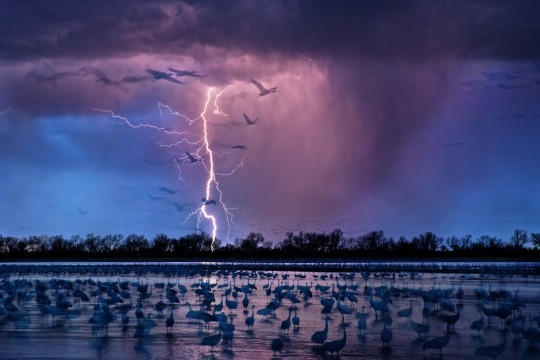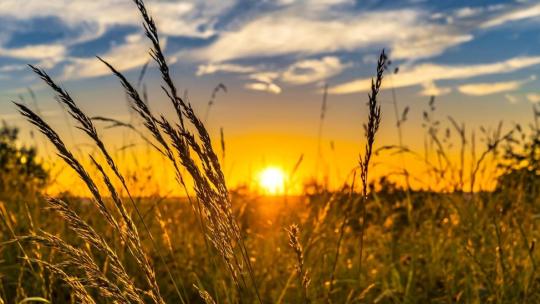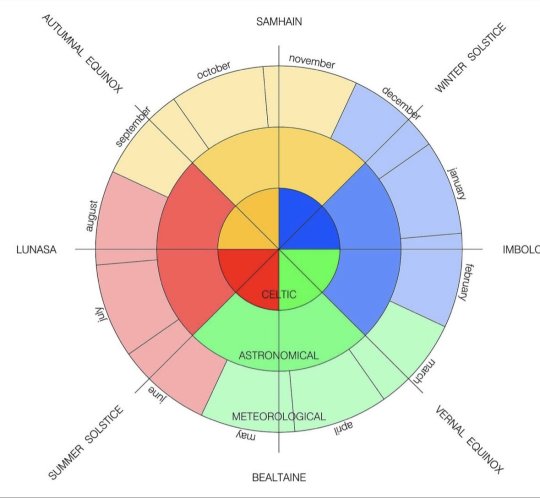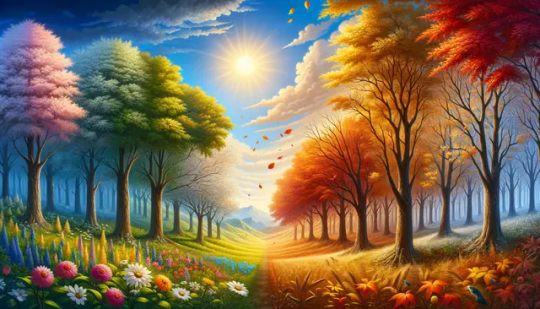#Seasons | Astronomical and Meteorological
Text

Snowcapped mountains serve as a backdrop to verdant landscapes at Gran Paradiso National Park in Valle d'Aosta, Italy. When does each new season start? Some measure seasonal shifts by Earth’s position relative to the sun, while others use annual temperature cycles. Photograph By Stefano Unterthiner
Every Season Actually Begins Twice—Here’s Why
Seasons can be defined in two different ways: Astronomical and Meteorological. We explain what they mean, and how to tell them apart.
— By Amy McKeever | May 31, 2023
Every three months, a new season begins—twice.
Spring creeps in like a lion on March 1, and then again a few weeks later with the equinox. Likewise, some people welcome the arrival of summer on June 1, while others celebrate it a few weeks later with the solstice. So who is right about when the seasons begin and end?
It depends on why you’re asking. Seasons are defined in two ways: Astronomical seasons, which are based on Earth’s position as it rotates around the sun, and Meteorological seasons, which are based on annual temperature cycles. Both divide the year into spring, summer, fall, and winter—yet with slightly different start and end dates for each. Here’s what they mean and how to tell them apart.
What are Astronomical Seasons?
People have always looked to the skies to determine the season. Ancient Rome was the first to officially mark those seasons with the introduction of the Julian calendar. Back then, the seasons began on different days than the modern era because of discrepancies with the Gregorian calendar used primarily today. Now, the start of each astronomical season is marked by either an equinox or a solstice.
Equinoxes are when Earth’s day is split almost in half. They occur every six months in the spring and fall, when Earth’s orbit and its axial tilt combine so that the sun sits directly above the Equator. On an equinox, roughly half the planet is light while the other half is dark. As the new season progresses, the sun’s position continues to change—and, depending which hemisphere you live in, the days will get progressively lighter or darker until the arrival of the solstice.
Solstices mark the brightest and darkest days of the year. They are also driven by Earth’s tilt and mark the beginning of astronomical summer and winter. When the Northern Hemisphere is tilted toward the sun, it is brighter and feels like summer—while, at the same time, the Southern Hemisphere is tilted away from the sun, plunging it into a dark winter.
But this method of measuring the seasons presents some challenges. The solar year is approximately 365.2422 Earth days long, making it impossible for any calendar to perfectly sync with Earth’s rotation around the sun. As a result, astronomical seasons start on slightly different days and times each year—making it difficult to keep the climate statistics that are used in agriculture, commerce, and more. That’s why weather forecasters and climatologists turned to meteorological seasons instead.

What are Meteorological Seasons?
Since at least the 18th century, scientists have sought better methods of predicting growing seasons and other weather phenomena. Over time, that gave rise to the concept of meteorological seasons, which are more closely aligned with both annual temperatures and the civil calendar.
Meteorological seasons are far simpler than astronomical seasons. They divide the calendar year into four seasons that each last exactly three months and are based on the annual temperature cycle. Winter takes place during the coldest three months of the year, summer in the hottest three months, and spring and fall mark the remaining transition months.
In the Northern Hemisphere, that means the start date for each season is March 1 (spring), June 1 (summer), September 1 (fall), and December 1 (winter). In the Southern Hemisphere, the seasons are reversed; spring begins in September, summer in December, fall in March, and winter in June.
The consistency of meteorological seasons allows meteorologists to make the complex statistical calculations necessary to make predictions and compare seasons to one another. “Dealing with whole-month chunks of data rather than fractions of months was more economical and made more sense,” climatologist Derek Arndt told the Washington Post in 2014. “We organize our lives more around months than astronomical seasons, so our information follows suit.”
So when is the first day of every season? It isn’t the first of the month or the position of the sun—it’s both.
#Environment#Seasons | Astronomical and Meteorological#Gran Paradiso National Park | Valle d'Aosta | Italy 🇮🇹#Earth’s Position | Rotation | Sun | Annual Temperature Cyclees#Equinoxes#Equator#Light 💡 | Darkness#March 1 (Spring) | June 1 (Summer) | September 1 (Fall) | December 1 (Winter)
0 notes
Note
I'm confused... Isn't the first day of the spring of 1st March?
I had to look this up, and I realize now there are multiple systems! Here's two search results that are directly contradicting each other about this:


checking out the first link, I found more info:

So if you're looking at the meteorological seasons, it is March 1!
If we're looking t astronomical, then it's started by the equinox, which, I also completely missed, was on 19.3.2024, and not 20 as I had thought because a roommate told me 'Hey it's the first day of spring today'. This information really updates a lot!
I'm guessing some countries take the meteorological, and some astronomical system as their default, we were always using the equinoxes and solstices as the default, I didn't even know about the other system until now.
Thank you for bringing me this new knowledge!
19 notes
·
View notes
Text
The June solstice occurs on Wednesday, June 21, 2023, at 10:58 A.M. EDT.

Summer begins with the solstice on Wednesday, June 21, 2023 marking the astronomical first day of summer in the Northern Hemisphere.
The June Solstice
In the Northern Hemisphere, the June solstice (aka summer solstice) occurs when the Sun travels along its northernmost path in the sky. This marks the astronomical start of summer in the northern half of the globe. (In the Southern Hemisphere, it’s the opposite: the June solstice marks the astronomical start of winter when the Sun is at its lowest point in the sky.)
What exactly IS the solstice? Is it really the longest day of the year? Welcome the solstice with some interesting facts and folklore.
#northern hemisphere's winter solstice#meteorological seasons#astronomical seasons#summer solstice#start of the summer season#June Solstice
2 notes
·
View notes
Text

June 1 marks the start of #MeteorologicalSummer, which is different than the start of astronomical summer on June 21.
"You may have noticed that meteorologists and climatologists define seasons differently from “regular” or astronomical spring, summer, fall, and winter. So, why do meteorological and astronomical seasons begin and end on different dates?" #NOAA
0 notes
Text

A diagram of the Irish seasons and months in the traditional/Celtic, astronomical, and meteorological modes, with the standard calendar months around the edges: courtesy of our one-county-over neighbor, @CarlowWeather, over on the platform formerly known as Twitter.
#Ireland#months#seasons#February 1#is the first day of spring for some here#not to mention#St. Brigid's Day#and Monday is a shiny new bank holiday
525 notes
·
View notes
Text
was readin up on the different dates autumn is considered to start
Or rather what would u consider the first of autumn. the Celtic season is in use in Ireland (altho not by met éireann 🙄) and follows gaelic Ireland's reckoning of seasons. Winter (Geimhreadh) is November, December, and January and begins on the first of November (feast of Samhain). Spring (Earrach) is February, March, and April and begins on the first of February (feast of Imbolc). Summer (Samhradh) is May, June, and July and begins on the first of may (feast of Bealtaine). Autumn (Fómhar=Harvest) is August, September, and october and begins on the first of august (feast of Lúnasa)
please reblog I'm so curious abt the distribution
#Five minutes until autumn!#Polls#Seasons#Gaeilge#Ireland#Irish#Was the paragraph at the end explaining the Irish calendar necessary kf course not#If there is any mistakes let me know ❤️
51 notes
·
View notes
Text
Cyno: Tighnari. what happens when winter arrives.
Tighnari: Cyno i’m so fucking sick of your jokes. they shit me up the fucking wall. i want you out of my house and out of our child’s life. you are no longer welcome anywhere within a 100km radius of me. If i see you i will not hesitate to get your ex daughter to bite you!
Cyno: Autumn leaves.
Cyno: you see this joke is funny because In the northern hemisphere winter officially starts on December 21 (winter solstice, astronomical winter), but for many places in the north, it is already cold. Did you know that there is more than one way to mark the start of winter? Meteorologists, people who study the weather, talk about meteorological winter which starts on December 1. When talking about seasons, winter comes after fall; fall is also known as autumn. In the autumn, leaves change colors and fall to the ground as the trees get ready for the winter, and the following spring. Autumn leaves are beautiful! Leaves, though, has another meaning. When something leaves, it goes away. For example, the teacher leaves home to go to work, and the student leaves school to go home. This joke is funny because it plays with two meanings of the word leaves: The tree has leaves that change colors in the autumn (autumn leaves), and autumn leaves, or goes away, so that winter can come.
Tighnari: get out.
#genshin impact#genshin#genshin impact imagines#genshin impact scenarios#genshin impact headcanons#tighnari#tighnari x cyno#cynonari#cyno#genshin incorrect quotes#incorrect quotes
174 notes
·
View notes
Text
just because it's september doesn't mean it's fall. i believe in astronomical season supremacy. None of that meteorological nonsense you guys aren't getting out of summer that easily. The 23rd is fall. You are experiencing the last summer!!! get out of that sweater!! hand back those pumpkins please those aren't even ripe yet
#now imagine this post said in the voice of an aging socialite desperately clinging on to the last of her youth#that is how i feel about summer ending dhdjjfjr#every single year. i simply REFUSE to get back in that sweater prematurely. never ready for SAD season
6 notes
·
View notes
Text
kinda hate that 'meteorological seasons' are just a period of calendar months and not like carefully determined each year via weather measurements like you're a maester from the citadel preparing to send out the white ravens. that's not any more 'meteorological' than the astronomical convention; you're picking convenient start and end points that roughly match the actual observed ground truth of the weather rather than having the seasons be determined by that ground truth. at least the astronomical ones are based on natural phenomena!
they should be called calendar seasons in my imo. and someone should be doing the maesters from the citadel thing. pls let me know if someone is.
10 notes
·
View notes
Text
#so christmas is one of the first days of winter but most people think of all of december as winter#but I think of it as winter has a really lit start but goes downhill#yes this was a mess to write out but I think most people disagree with me on this one so I am curious
6 notes
·
View notes
Text
International friends, when do seasons start for you?
I was talking to @lohikaar in the USA this morning and they casually dropped the information that seasons don't strictly correspond to months in the USA—for example, winter is December 21 to March 20th, presumably being a solstice-to-equinox thing.
Whereas here (Australia), we just define each season as being 3 months. So our summer is all of December, January and February every year—1st of December to 28th of February.
It looks like several countries in the Americas do this—we looked up Canada and Brazil also—but I'd be interested to know if people have different season start/end expectations in other countries, too.
Edit: it's meteorological seasons vs astronomical seasons! a kind friend in the replies has provided the search terms I need. Thank you!
#man-made construction of seasons OOo#cultural differences#this was brand new information to me#I thought they were just switched around#Not on different dates!
37 notes
·
View notes
Note
Thank you for explaining! I didn't even know about astronomical seasons!
yeah I didn't know about meteorological! I'm happy to have learned it too :)
I was trying to find out what part of the world uses meteorological seasons, but it seems to difficult to learn, I only found out that Finland and Sweden have their own way of determining seasons, by daily temperatures, and it's not mandated by dates, while tropical regions has Dry Season, Monsoon and for some Harmattan or mild season.
Where are you from anon? And I don't mean specifically, but is it north, south, what continent? I'm curious to where the seasons are counted like this.
#seasons#meteorological seasons#astronomical seasons#tell me where you live and when does spring begin for you!
1 note
·
View note
Text
Learn about the difference between astronomical and meteorological seasons.
Traditionally, summer and winter solstices helped mark the changing of the seasons—along with their counterparts, the spring and autumnal equinoxes. However, today’s meteorologists officially use temperature records instead to draw lines between the seasons. So what exactly are solstices—and how have they been celebrated throughout history? Here’s all you need to know.
#meteorological seasons#autumnal equinoxes#solstices#summer solstice#winter solstice#astronomical seasons
0 notes
Text

AI-generated image
Autumn, as experienced in the Southern Hemisphere, unfolds its beauty from March to May, transitioning the natural world from the vibrant heat of summer to the cooler, reflective time of winter. This seasonal shift can be observed from two distinct perspectives: meteorological and astronomical, each offering a different framework for understanding and engaging with this transformative period.
Meteorological Autumn in the Southern Hemisphere is defined by the climatic pattern and encompasses the months of March, April, and May.
Astronomical Autumn is determined by the Earth's tilt and orbit around the Sun, beginning with the autumnal equinox in March (20 March 2024) and ending with the winter solstice in June (20 June 2024).
As the days shorten and the air chills, take the time not only to observe and appreciate the season's beauty, but to discover your own inner landscapes.
This season, challenge yourself to explore your thoughts and feelings through moments of stillness.
Is there a part of you that's seeking attention or a new hobby that calls to your heart?
Autumn's quiet can be a catalyst for discovering or reigniting passions that align with your deepest self.
#self care#self improvement#goddessnature#goddess#goddessbeing#womanism#positive mental attitude#womanist#astronomy
2 notes
·
View notes
Text
Small disclaimer: This post is for Northern hemisphere only.
Google says that Spooky season (shopping and selling season for Halloween collectors and traders) starts on July 5th.
July 26th is when the Flagship Spirit Halloween seasonal store opens and the rest open on that day or soon after.
August 1st is when Price Chopper puts Pumpkin Spice doughnuts back in their bakery every year.
Today is meteorological First day of autumn. (September 1st)
Monday, September 4th is the "unofficial end of summer."
September 23rd is the astronomical first day of autumn, the autumn equinox. (When day and night are perfectly balanced.
I get kind of annoyed when people say "It's not autumn until the equinox." They then turn my favorite season into the shortest season of the year because it's very rare that those same people would be walking around on December 20th going "It's not winter yet!"
Autumn is my favorite season. As Google says Spooky season started on July 5th that's when autumn began for me. So there. :-P
6 notes
·
View notes




